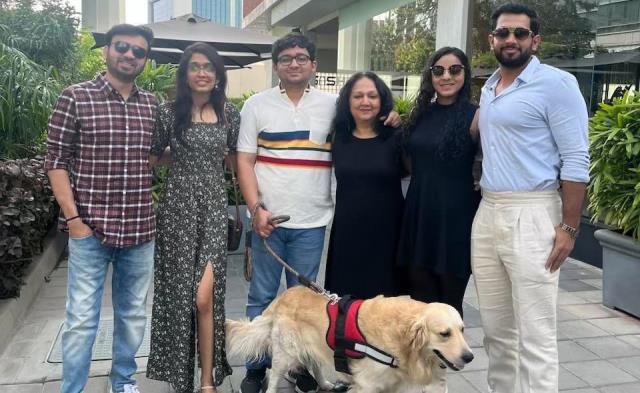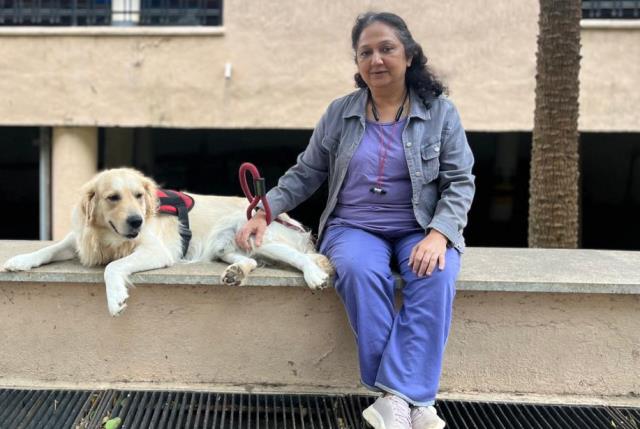Madhuri Sharma, 55, urges elderly parents to dive back into their forgotten interests and allow their children to deal with their own stresses. Her views:
In today’s world, the “empty nest” doesn’t necessarily happen when children physically leave home; it begins when they start crafting lives of their own, where parents are no longer at the center. Let’s be honest with ourselves. Nature starts preparing us for an empty nest the moment a child is born. They go from a being that was entirely dependent on us, physically and emotionally, to growing into their own person with their own world.
From those early days, a child’s needs slowly broaden beyond just their parents. First, it’s toys and friends, then teachers and mentors. Somewhere around teenage years, that fear sets in for parents who sense that they are no longer their child’s whole world. By the time children head off to college, many no longer study in their hometowns, and you find yourself waiting for holiday visits or the occasional phone call. Some parents might even insist on “one call a day,” but realistically, you know you can’t push it.
The realization of an empty nest really hits when you find yourself in this waiting mode. Even while the child is still at home, the presence of friends, mentors, and eventually partners shifts the dynamics. When my own children got married, I found myself in that “tricky territory” of adjusting to new routines and shared priorities. Understanding as you may be, it takes time to adjust to the fact that you’re no longer the number one priority in your child’s life. This shift can be jarring for many parents, especially for those who think of themselves as modern and ‘open-minded.’
I noticed this even among my friends, cousins, and brother. They couldn’t understand why their kids wanted to live outside the family home during college, even though they gave them all the freedom they could. But we have to understand: we gave them life, but they are entirely separate individuals. Every parents should reflect on Khalil Gibran’s wisdom in his poem On Children, “Your children are not your children. They are the sons and daughters of Life’s longing for itself. They come through you but not from you, And though they are with you, yet they belong not to you…”
ALSO READ: ‘Parenting Does Not Require You To Be Helicopter Mom’
For most parents, this realization doesn’t come naturally. We start living our lives through our kids, trying to help them live the dreams we didn’t fulfill. When you become a parent, your identity and priorities often shift toward theirs. The food we make, the stories we tell, the books we read – it all becomes about them. And for 15, maybe 20 years, our own self takes a backseat. So when the child becomes independent, and you see them creating a life that doesn’t revolve around you, it’s time to rediscover yourself. It’s time to revisit your own passions. Pick up a pen and write down the activities or interests you used to love.

It could be as simple as enjoying a quiet cup of tea or watching people go by. Even married children find it hard to let go of their parents sometimes unintentionally creating emotional traps. But I encourage parents to avoid being pulled into these dynamics. Both parents and children need space to live fully. For me, both kids’ marriages and the passing of my husband were profound life changes.
It was a strange, sudden emptiness, but I also realized my kids worried about me too. I was welcome to join them in their activities (going for movies, visiting pubs…), but it’s just different with a spouse. Their music, their food, their lifestyle – it’s not necessarily what I enjoy. I realized I didn’t want to become their responsibility. So I started looking for activities which didn’t involve them. When I took a short vacation or went to a movie with friends, it was for myself as much as for them. It gave my kids a sense of freedom, a sense of relief. And this is very important. Do we really want our children to keep worrying about us when they have their own lives?
Movies like Baghban can feed into this narrative of children as villains if they don’t center their lives around us. But our kids have their own stresses, and us going into ‘victim mode’ every time we need them doesn’t help. We need to start doing things for ourselves. I used to love listening to music, meeting friends, reading books– things that took backseat during parenting. I’ve realised that this is the best time to reconnect with what we loved. When we were growing up, we did things to impress our parents, then our peers, then for our careers. Now, we can do things just for us.
We don’t need to earn anyone’s approval or wonder if this particular interest will add to your CV. I urge every parent to dive back into those forgotten interests. It doesn’t have to be perfect. You don’t need to be a great singer , sing because you want to or a dance even if you have two left feet. Just go out there and sing, scribble, or dance if it brings you joy. Pick up that pencil, those dancing shoes or simply sit and road life goes by– this is the time to reclaim your life and let your kids live theirs.
As told to Mamta Sharma
